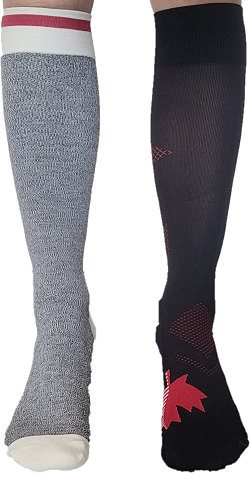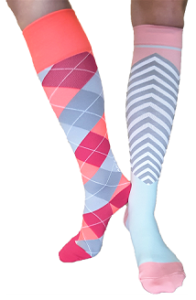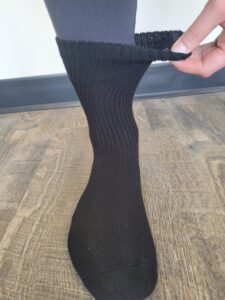
What socks should I wear?
There are many different types of socks that you can wear and it can be difficult to know which socks are right for you. If you have issues with leg swelling, varicose veins or diabetes, choosing the right sock can make a difference.
Leg Swelling
It is normal to have some leg and feet swelling and you may find that your shoes feel a little tighter when taking them off at the end of the day. If your legs are swelling at the end of the day and you don’t have any varicose veins, there are a couple options to choose from.
 Compression Socks
Compression Socks
If most of your day consists of standing in one place or sitting, or your swelling leads to achy legs at the end of the day, compression socks may be a great option. Compression socks have a higher compression at the ankle, and a lesser compression as you go up the leg. They function to push all the fluids back towards the heart and prevent pooling in the legs. Compression socks can not only help with comfort during the day, but to prevent varicose veins from developing.
There are many risk factors to developing varicose veins, but sitting or standing for most of the day is one of them. This is because when we don’t use our calf muscle frequently during the day, the blood doesn’t have this strong pump to push it towards the heart.
A non-medical level compression is typically a good place to start when dealing with general swelling and preventing varicose veins. A prescription is not required for this level and it is the 15-20mmHg pressure or less.
 Diabetic Socks
Diabetic Socks
Diabetic socks are not limited to people who have diabetes. These socks have a non-restrictive top to allow the fluids to flow freely through the leg. These socks won’t prevent swelling, but it will reduce lines that develop on the leg at the end of the day. Diabetic socks can be an alternative to compression socks if you are not looking to reduce the swelling, but instead, looking to reduce the lines that develop around the leg.
Varicose Veins
If you already have varicose veins, compression socks are typically recommended. Compression socks help to prevent pooling in these veins and reduce the chance of blood clots.
Typically, a medical level compression is recommended for varicose veins, which is a 20-30mmHg level compression.
For those who have a hard time putting on compression socks, a 15-20mmHg or 8-15mmHg level compression is a great place to start. Although it may not provide the same level of compression as the medical grade, it’s better than wearing nothing and they are much easier to put on.
Diabetic
Those with diabetes have to be careful with the socks that they wear. This is because of the complications that can arise from diabetes. If there is decreased blood flow to the extremities, slight pressure from socks may cut off circulation to the feet.
Diabetic socks allow proper blood flow with a non-restrictive top. These are usually recommended for those with diabetes, and a physician consultation is not needed before trying them out.
In some cases, compression socks can be recommended to those with diabetes. Before wearing them, a conversation with your physician is highly recommended. This is to prevent negative effects that can arise with compression socks and diabetes. If a physician recommends them, it may be a very light compression such as 8-15mmHg.
Sports & Exercise
Compression socks can be a benefit with sport and exercise recovery to help circulate the blood. At the end of a workout, there can be swelling. This is because the body wants to heal from all the work that the muscles and joints just performed. The compression socks will help to reduce any swelling in the feet and legs to potentially aid in recovery.
Conclusion
Choosing the right sock can make a difference to improve comfort. If you are unsure of what sock is best to you, either reach out to your physician or contact us for more information.

You must be logged in to post a comment.